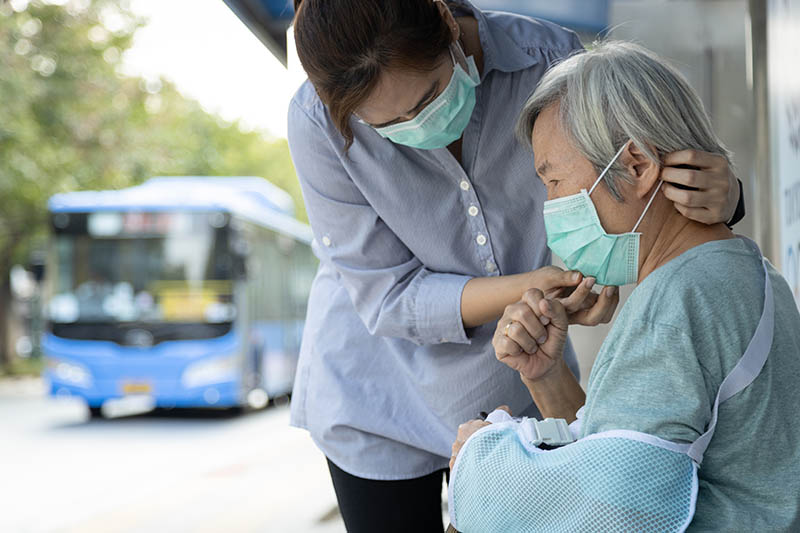SkilledNursingNews.com —
Senior housing and care leaders again called on the federal government to aggressively bankroll COVID-19 universal testing in the nation’s nursing homes, arguing that the burden will be ongoing — especially since an already expensive one-time testing strategy may not be an instant cure-all.
Given recommendations from the White House and Centers for Medicare & Medicaid Services (CMS) for universal testing in nursing homes, the federal government’s current strategy of leaning on states is not sufficient to meet what could be an indefinite demand for coronavirus tests among providers, LeadingAge CEO Katie Smith Sloan argued.
“While we support the recommendation, it is irresponsible of federal leaders to tell nursing home providers to ‘talk to your governor’ to supply and pay for testing — it would be equally inappropriate to ask other aging services providers to do the same,” Sloan wrote in a letter to Congressional leaders late last week. “A few governors are covering the first round of such testing, but many are not, and most cover only one test, at best a snapshot in time.”
Sloan addressed the letter to House Speaker Nancy Pelosi, House Minority Leader Kevin McCarthy, Senate Majority Leader Mitch McConnell, and Senate Minority Leader Chuck Schumer.
Universal testing, funding called for
In particular, Sloan asked for unilateral coverage of COVID-19 testing in nursing homes, assisted living facilities, and other congregate living settings.
“While the CARES Act requires health insurers, both private and public, to cover testing costs, it is not clear that insurers are able to or will cover multiple tests,” Sloan wrote. “The cost needs to be covered by the federal government to ensure availability of tests in all settings, especially if mandated. In addition, health insurers are not necessarily covering ancillary costs.”
Those ancillary costs, which Sloan also believes the federal government should cover, include staffing expenses; personnel must perform the tests, and the long-term care workforce has already been ravaged by the disease.
Sloan additionally asked Congress to fully fund the testing costs for nursing home staffers, whose private insurance may not cover multiple tests, and to create a dedicated pot of money to pay for temporary staffers to sub in for those who test positive and must self-quarantine for two weeks.
While officials have insisted that new guidelines around reporting COVID-19 cases to CMS and the Centers for Disease Control & Prevention (CDC) are not designed to be punitive, Sloan urged Congress to work with facilities instead of assessing fines.
“Require that state surveyors enforcing federal nursing home requirements provide collaborative feedback to nursing home providers; do not allow efficient testing practices to result in punitive citations and penalties,” she wrote.
Industry leaders, resident advocates, and academics have all called for universal testing in nursing homes since the start of the pandemic, though achieving that goal has been difficult.
CMS recommends conducting a one-time baseline test as a prerequisite for starting the process of reopening nursing homes to visitors, along with weekly tests for staff thereafter; states such as New York have mandated twice-weekly tests for nursing home workers.
The White House, through the vice president and coronavirus task force coordinator Dr. Deborah Birx, issued an informal two-week goal for testing all 1.3 million nursing home residents in mid-May, though it was never enshrined in formal guidance or orders.
Even assuming universal access to test kits and lab space — neither of which is guaranteed in many parts of the country — the costs of universal testing alone are staggering, with the American Health Care Association (AHCA) pegging the one-time expense of testing every nursing home resident and employee at $440 million. Add in assisted living facilities, and the number balloons to $672 million.
The Department of Health and Human Services (HHS) released $4.9 billion in CARES Act aid to nursing homes last week, but leaders have classified that funding as only a start given the looming testing bill — among other expenses.
CMS administrator Seema Verma has repeatedly asserted that there’s enough capacity at the state level to meet federal and state testing guidelines, and the federal government has largely left testing decisions to the individual states; Verma has also pointed to approximately $11 billion to $14 billion in testing funding set aside for states in the CARES Act stimulus package.
But Sloan’s letter comes at a time when the general consensus around universal testing has subtly changed. While experts are generally in agreement that testing nursing home residents and staff for COVID-19 is never a bad option, there are increasing questions about how much a one-time test will really tell a nursing home operator struggling to keep residents safe.
“The circumstance that a particular facility might be in should be considered as part of the decision about deploying these large-scale testing efforts,” CDC epidemiologist Dr. Nimalie Stone said during a CMS-hosted call with nursing home leaders last week. “For example, the value of doing a snapshot of all the residents in a building that’s already had a known, very large-scale outbreak of COVID — it may not be quite as valuable, because we have to ask the question, well, what are we going to do differently at this point with that data?”
Stone acknowledged that there’s “tremendous value” in universal testing at facilities without recent cases, helping staff develop a cohorting strategy and other preventative measures.
But in Massachusetts, a state where all but 10 nursing homes have completed universal testing as of Friday, an executive told the Boston Globe that the battle is only beginning.
“I would say the worst of this surge has passed for now, but we are going to remain ever-vigilant,” BaneCare CEO Rich Bane told the publication. “The new normal is intense vigilance on infection control until we can have a vaccine.”
…
…

